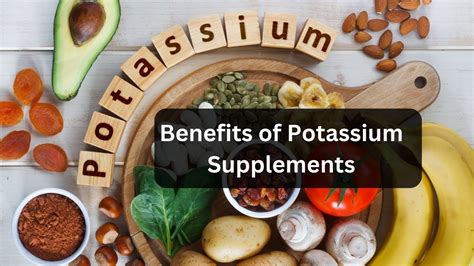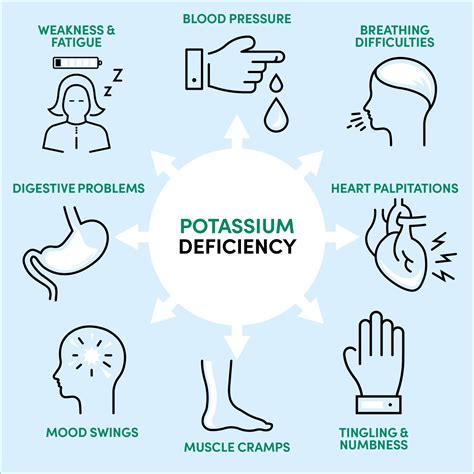Intro
Discover the 7 potassium pill side effects, including muscle cramps, digestive issues, and heart problems, and learn how to manage potassium supplements safely, avoiding interactions and overdose, for overall health and wellness.
Potassium is an essential mineral that plays a crucial role in maintaining various bodily functions, including heart health, muscle contractions, and nerve function. While potassium supplements can be beneficial for individuals with potassium deficiencies, they can also cause side effects, especially when taken in excess. In this article, we will delve into the potential side effects of potassium pills and explore the importance of responsible supplementation.
Potassium pills are often prescribed to individuals with hypokalemia, a condition characterized by low potassium levels in the blood. However, even with a prescription, it is essential to be aware of the potential side effects associated with potassium supplementation. Some of the most common side effects of potassium pills include gastrointestinal issues, such as nausea, vomiting, and diarrhea. These symptoms can be mild and temporary, but in some cases, they can be severe and require medical attention.
The severity and likelihood of side effects from potassium pills depend on various factors, including the individual's overall health, the dosage, and the duration of supplementation. It is crucial to follow the recommended dosage and consult with a healthcare professional before starting any new supplement regimen. Moreover, individuals with certain medical conditions, such as kidney disease or heart problems, should exercise caution when taking potassium pills, as they may be more susceptible to adverse effects.
Potassium Pill Side Effects

Potassium pills can cause a range of side effects, from mild to severe. Some of the most common side effects include:
- Gastrointestinal issues, such as nausea, vomiting, and diarrhea
- Abdominal cramps and bloating
- Fatigue and weakness
- Muscle cramps and spasms
- Headaches and dizziness
- Rash and itching
Severe Side Effects of Potassium Pills
In rare cases, potassium pills can cause severe side effects, including: * Cardiac arrhythmias and irregular heartbeats * Muscle paralysis and weakness * Respiratory failure and shortness of breath * Gastrointestinal bleeding and ulcers * Allergic reactions and anaphylaxisBenefits of Potassium Supplements

While potassium pills can cause side effects, they also offer several benefits, particularly for individuals with potassium deficiencies. Some of the benefits of potassium supplements include:
- Improved heart health and reduced risk of cardiovascular disease
- Enhanced muscle function and reduced muscle cramps
- Improved nerve function and reduced risk of nerve damage
- Regulated blood pressure and reduced risk of hypertension
- Improved bone health and reduced risk of osteoporosis
Potassium-Rich Foods
In addition to supplements, individuals can also increase their potassium intake through a balanced diet rich in potassium-rich foods. Some of the best sources of potassium include: * Leafy greens, such as spinach and kale * Fruits, such as bananas and avocados * Legumes, such as white beans and lentils * Nuts and seeds, such as almonds and pumpkin seeds * Whole grains, such as brown rice and quinoaPrecautions and Interactions

When taking potassium pills, it is essential to be aware of potential interactions with other medications and medical conditions. Some of the precautions and interactions to consider include:
- Kidney disease and kidney failure
- Heart problems and cardiac arrhythmias
- Gastrointestinal disorders, such as ulcers and bleeding
- Interactions with medications, such as diuretics and blood thinners
- Pregnancy and breastfeeding
Responsible Supplementation
To minimize the risk of side effects and ensure responsible supplementation, individuals should: * Consult with a healthcare professional before starting any new supplement regimen * Follow the recommended dosage and duration of supplementation * Monitor potassium levels and adjust the dosage as needed * Be aware of potential interactions with other medications and medical conditions * Maintain a balanced diet rich in potassium-rich foodsPotassium Deficiency Symptoms

Potassium deficiency, also known as hypokalemia, can cause a range of symptoms, including:
- Muscle weakness and cramps
- Fatigue and lethargy
- Heart palpitations and arrhythmias
- Numbness and tingling in the extremities
- Constipation and abdominal bloating
Diagnosing Potassium Deficiency
Diagnosing potassium deficiency typically involves a physical examination, medical history, and laboratory tests, such as: * Blood tests to measure potassium levels * Urine tests to measure potassium excretion * Electrocardiogram (ECG) to evaluate heart function * Imaging tests, such as X-rays and CT scans, to rule out underlying medical conditionsTreatment Options for Potassium Deficiency

Treatment options for potassium deficiency depend on the severity and underlying cause of the condition. Some of the treatment options include:
- Potassium supplements, such as potassium pills or liquid potassium
- Dietary changes, such as increasing potassium-rich foods
- Medications, such as potassium-sparing diuretics
- Hospitalization and intravenous potassium therapy in severe cases
Preventing Potassium Deficiency
Preventing potassium deficiency involves maintaining a balanced diet rich in potassium-rich foods, staying hydrated, and managing underlying medical conditions. Some of the ways to prevent potassium deficiency include: * Eating a variety of potassium-rich foods, such as leafy greens and fruits * Drinking plenty of water and limiting sodium intake * Managing underlying medical conditions, such as kidney disease and heart problems * Avoiding medications that can cause potassium deficiency, such as diureticsConclusion and Final Thoughts

In conclusion, potassium pills can cause side effects, but they also offer several benefits, particularly for individuals with potassium deficiencies. To minimize the risk of side effects and ensure responsible supplementation, individuals should consult with a healthcare professional, follow the recommended dosage, and maintain a balanced diet rich in potassium-rich foods. By being aware of the potential side effects and benefits of potassium supplements, individuals can make informed decisions about their health and well-being.
What are the common side effects of potassium pills?
+The common side effects of potassium pills include gastrointestinal issues, such as nausea, vomiting, and diarrhea, as well as abdominal cramps, fatigue, and muscle cramps.
Can potassium pills interact with other medications?
+Yes, potassium pills can interact with other medications, such as diuretics and blood thinners, and individuals should consult with a healthcare professional before starting any new supplement regimen.
How can I prevent potassium deficiency?
+Preventing potassium deficiency involves maintaining a balanced diet rich in potassium-rich foods, staying hydrated, and managing underlying medical conditions, such as kidney disease and heart problems.
We hope this article has provided you with valuable information about the potential side effects of potassium pills and the importance of responsible supplementation. If you have any questions or concerns, please don't hesitate to comment below. Share this article with your friends and family to help them make informed decisions about their health and well-being.
